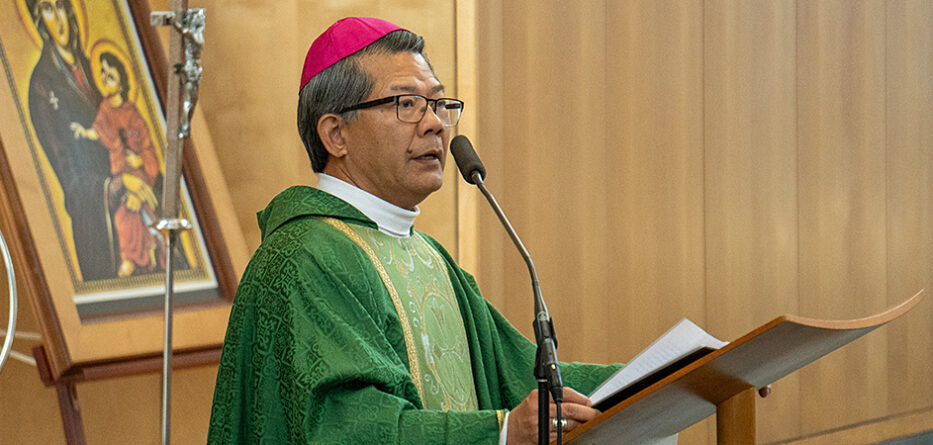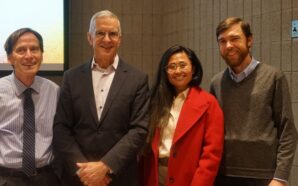Most Reverend Vincent Long Van Nguyen OFM Conv DD STL, Bishop of Parramatta
Homily for the 10th Sunday in Ordinary Time, Year B
Readings: Genesis 3:9-15; Psalm 129(130); 2 Corinthians 4:13 – 5:1; Mark 3:20-35
9 June 2024
Authentic discipleship as the mark of membership of God’s household
Dear sisters and brothers,
In recent times, there have been fierce debates in our parliament regarding the status of non-citizens who have served prison time for the crimes they committed. Many of these have lived in Australia for most of their lives and have little or no connection with their countries of birth. Under pressure, the government have prioritised community safety rather than the ties of these people to Australia as a primary consideration in visa decisions. This change of direction has not pleased our closest neighbour who argues that people with no connection to New Zealand should not be deported to New Zealand.
At the heart of these debates is the question of belonging. It is our citizenship that enables us to belong and enjoy the rights in our country. It is our biological bloodline that enables us to belong and be part of our natural family. The Word of God this Sunday, however, speaks of God who forms us into a new household that is beyond nationality, race, gender or status. In this household, it is not the citizenship certificate or biology and blood but an authentic Christian discipleship that qualifies us as its members.
The first reading seems to be a sad account of temptation, sin, denial, blame and curse. After falling to the temptation by Satan, Adam and Eve found themselves in hiding from God. They did their best in blaming someone else rather than admitting their guilt. But that is not how the story ends. God promises that evil will not triumph and the new offspring will overpower the forces of the serpent. The story of the fall is followed by the promise of redemption and renewal. Jesus, the new Adam, was the offspring of the woman who would become the head of God’s new creation.
The Gospel today speaks of a homecoming on the part of Jesus. He returned to Nazareth with his disciples after a period of preaching, healing and ministering among the people. But instead of a hero welcome, Jesus got a very chilly reception, not only from his adversaries but also from his own family and relatives. In the face of misunderstanding and rejection on the part of the latter, prejudice and hostility on the part of the former, his fidelity shone through. He was not deterred by indifference or down right opposition. It is a lesson for us as we endeavour to follow his example and live out the demands of Christian discipleship in challenging times.
Jesus often met entrenched prejudice on the part of the privileged and influential such as the scribes and Pharisees. He challenged their adversarial and stereotyped mentality. The God he preached upset them because this God did not reject the socially marginalised, the ritually unclean or the morally inferior. Indeed, in his many encounters, it was the tax collector, the foreigner, the blind, the lame etc… who were the beneficiaries of God’s unstinting goodness and love.
The litmus test of Christian discipleship is complete fidelity to the cross in the footsteps of the suffering Messiah. This fidelity would cut through biological bloodlines and traditional structures. The early Christians knew only too well the cost of belonging to God’s household. They experienced not only social disadvantage but at times even rejection from their own family. Christian discipleship ultimately takes us to Jerusalem with the Suffering Servant of God. Nothing short of a total consuming passion will see us through.
For this reason, Jesus uses very strong images of family divisions to emphasise the importance of authentic discipleship. As a result of following him, father could be divided against the son, mother against daughter… It is a call to us to be loyal first and foremost to God and the works of his kingdom. “Anyone who does the will of God is my brother and sister and mother.”
Jesus challenges us as he challenged the disciples to move from the cultural model of power, dominion and self-preservation to the new Kingdom model of service, love and self-sacrifice. This understanding of the Church as a counter-witness to relationships based on privileges, entitlements and class distinctions is nothing short of a revolution. We are all brothers and sisters and share a common identity as members of God’s family.
Dear sisters and brothers,
Today, we may not face a hard choice between our faith and our family or our livelihoods. Nonetheless, Christian discipleship demands our moral courage, integrity and fidelity. It is our commitment to the truth of the Gospel even at the hazard of incurring the ridicule of others. Let us live the call of the Christian discipleship in an era where there is much mistrust, scepticism, partisanship and polarisation. May Mary who was not only a mother of Jesus in the biological sense but even more so in terms of her faithful discipleship inspire us to be servants of the kingdom and witnesses to the Gospel. Let us follow her example of fidelity and together with her Son bring about the triumph of God’s plan of redemption.








